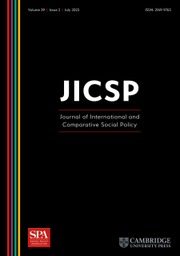Article contents
Radical right framing of social policy in Hungary: between nationalism and populism
Published online by Cambridge University Press: 09 March 2020
Abstract
The populist radical right (PRR) is increasingly associated with welfare chauvinism, but the literature mainly focuses on Western and Northern European cases. Turning attention to Central Eastern Europe, this article investigates how PRR parties in Hungary frame welfare issues in five social policy areas from 2010 to 2016. This is done through a critical frame analysis applied to party manifestos and State of the Nation speeches by the Fidesz and Jobbik parties. Special care is taken to delineate the interlocking but not interchangeable concepts of nationalism and populism, as recent research asserts this distinction is often overlooked. The main findings are threefold: First, these parties articulate their positions chiefly through nationalist rather than populist framing; Second, while Hungary's PRR exhibits welfare chauvinist framing similar to Western and Northern Europe, a main difference detected was the role of the communist legacy; Third, beyond the article's original goals, the findings revealed a strong connection between nationalist framing and the role of gender, suggesting that the two are not mutually exclusive.
- Type
- Articles
- Information
- Copyright
- Copyright © 2018 Informa UK Limited, trading as Taylor & Francis Group
References
- 11
- Cited by


